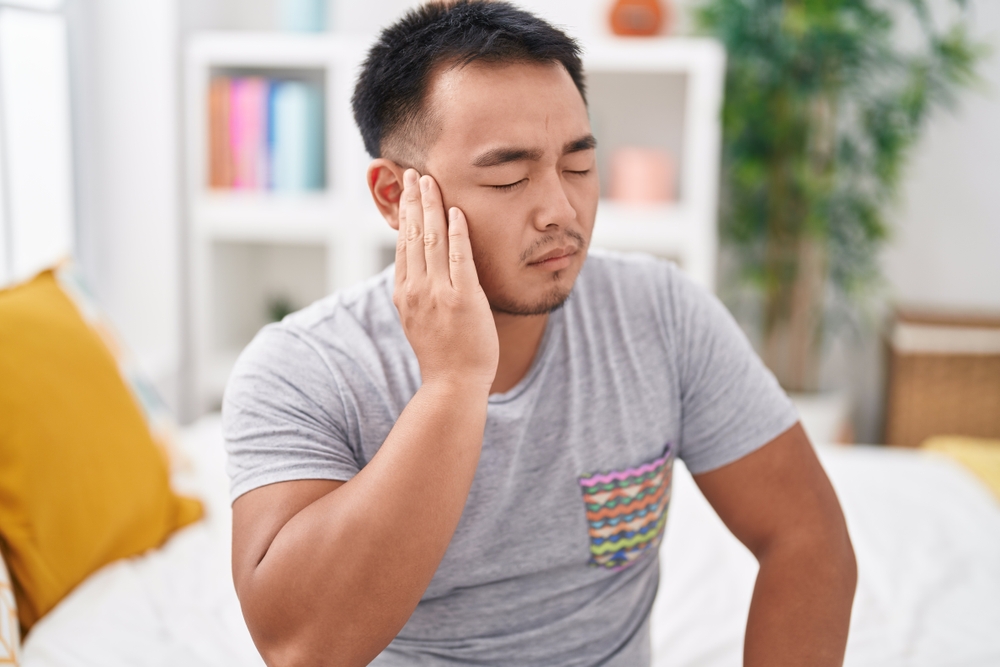If you’re experiencing ear pain without the signs of an ear infection, it may be linked to your temporomandibular joint (TMJ). Many individuals with temporomandibular joint disorders report ear pain as a common symptom. While it might seem unrelated, the connection between TMJ disorders and ear pain is significant. Understanding how TMJ can contribute to ear discomfort is essential for seeking the appropriate treatment and regaining your comfort and quality of life.
What are TMJ disorders?
The temporomandibular joint connects your jawbone to your skull, situated on either side of your jaw. This joint plays a crucial role in daily functions like chewing, speaking, and yawning. When the TMJ malfunctions due to injury, arthritis, or other health issues, it can lead to a variety of uncomfortable symptoms collectively referred to as TMJ disorder.
Symptoms of TMJ disorders
In addition to ear pain, TMJ disorders can produce a range of symptoms that may affect your overall well-being:
- Jaw Pain or Tenderness: Discomfort around the jaw joint is one of the hallmark signs of TMJ disorders.
- Difficulty Chewing: Individuals with TMJ often find chewing to be painful or uncomfortable, leading to dietary restrictions.
- Jaw Clicking or Popping: Many people notice a clicking or popping sound when opening or closing their mouths, which can be alarming.
- Headaches: Tension in the muscles surrounding the jaw can radiate to the head, causing frequent headaches or migraines.
- Lockjaw: Some individuals may experience difficulty fully opening or closing their mouths due to muscle tension or joint dysfunction.
The link between TMJ disorders and ear pain
One of the more surprising symptoms associated with TMJ disorders is ear pain. The close proximity of the TMJ to your ears explains this connection. The joint is located just in front of the ear, so when it becomes inflamed or misaligned, discomfort can radiate, leading to pain that feels as though it originates from the ear. This can mimic the sensations of an ear infection or pressure in the ear, even when the underlying issue stems from the jaw joint.
The experience of ear pain linked to TMJ can vary significantly; it can range from mild discomfort to sharp, persistent pain. Additionally, some individuals report a feeling of fullness or pressure in the ear, similar to what one might experience during sinus congestion or an actual ear infection. If you’ve been coping with unexplained ear pain, it’s crucial to consider that TMJ disorders could be the underlying cause.
Seeking a professional diagnosis
If you are experiencing persistent ear pain along with other symptoms associated with TMJ disorders, it is essential to consult an ENT specialist. An ear, nose, and throat (ENT) doctor can conduct a comprehensive evaluation, including a thorough history and physical examination. Imaging tests such as X-rays, CT scans, or MRIs may also be utilized to assess the condition of your TMJ. These assessments help rule out other potential causes of ear pain, confirming whether TMJ is contributing to your discomfort.
Treatment options for TMJ disorders and ear pain
Fortunately, there are several treatment options available for managing TMJ disorders and the associated ear pain. These may include:
- Over-the-Counter Pain Relievers: Nonsteroidal anti-inflammatory drugs (NSAIDs), like ibuprofen, can help reduce inflammation and alleviate pain in the jaw and ear areas.
- Physical Therapy: Specific jaw exercises and stretches can strengthen the muscles around the TMJ and improve its function.
- Mouthguards: If bruxism (teeth grinding) contributes to your TMJ issues, wearing a night guard can help protect your teeth and reduce strain on the joint.
- Lifestyle Modifications: Stress management techniques, improved posture, and avoiding hard or chewy foods can alleviate some of the pressure on the TMJ.
- Surgical Interventions: In severe cases where conservative treatments are ineffective, surgical options may be considered to repair or replace the damaged joint.
Navigating TMJ disorders and ear pain
While ear pain is a common symptom of TMJ disorders, it’s vital to recognize that the issue typically originates from the jaw, not the ear itself. If you are experiencing ear pain alongside jaw discomfort, popping sounds, or headaches, TMJ disorders could be the cause. By obtaining a proper diagnosis from an ENT specialist and exploring effective treatment options, you can find relief from both your ear pain and other associated symptoms.
For further assistance with TMJ-related symptoms and to discuss potential treatment options, find an ENT specialist near you.
